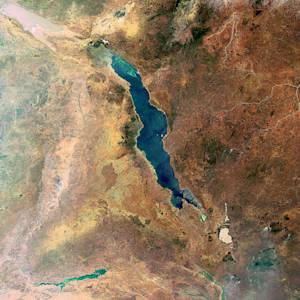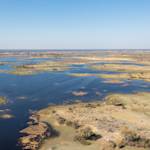Congo River
2023 CE • West-Central Africa
"The Congo River is a long, arcing river with a basin that spans nine countries in West-Central Africa. This extensive body of water provides food, water, medicine and transport to about 75 million people in the surrounding basin . . . The Congo River zigzags across the equator twice as it flows from eastern Africa, through the Congo rainforest, all the way to the Atlantic Ocean . . . From its tributaries to where it meets the Atlantic Ocean, the massive river includes rapids, wetlands, floodplains, lakes and swamps." The Congo is noted for being world's deepest river at 720 feet, "too deep for light to penetrate." The Congo holds great ecological significance, harboring an array of wildlife and supporting diverse ecosystems. Its waters provide habitat for countless fish species, including the Congo River dolphins. Along its banks, dense forests teem with life, hosting iconic African wildlife such as elephants, gorillas, bonobos, and numerous bird species. "The region surrounding the Congo River holds an abundance of valuable resources, from ivory to rubber to timber", making it a site for rampant exploitation. Additionally, the river and its surrounding region are vulnerable to climate change and pollution, posing significant threats to this fragile ecosystem.
Holly Secon, "The Congo River Basin: Home of the deepest river in the world," Live Science, August 05, 2020.
Image: MONUSCO Photos, CC BY-SA 2.0, via Wikimedia Commons


Learn about Maya Lin’s fifth and final memorial: a multi-platform science based artwork that presents an ecological history of our world - past, present, and future.

Discover ecological histories and stories of former abundance, loss, and recovery on the map of memory.

Learn how we can reduce our emissions and protect and restore species and habitats – around the world.

See how art can help us rethink the problems we face, and give us hope that each one of us can make a difference.

Help make a global memorial something personal and close to home. Share your stories of the natural world.

